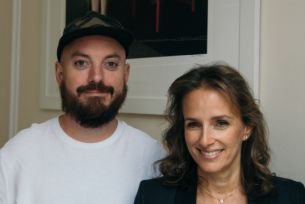
Moxie Pictures Hires Rob Hughes as Head of Culture

Production company Moxie Pictures has appointed cultural/artistic director Rob Hughes as Moxie’s Head of Culture. For the last eight years Rob has worked in advertising, music video, theatre and short film. He previously held roles at Creature of London, where he established and led the agency’s culture department, and at Mother, where he was a creative consultant. His credits included I Want Muscle (Design of the Year Nominee, The Design Museum & Best Fashion Film of the Year ASVOFF), The Hairy Ape (Southwark Playhouse), the Olivier-nominated Alice’s Adventure Underground and most recently, a theatrical dining experience put together with Bompas & Parr based on Roald Dahl’s The Twits.
Rob also works as an independent curator of cultural cinema. He used to co-curate the Short & Sweet Film Festival, and three years ago he founded and serves as the artistic director of Conclave, a weekly short film festival featuring the very best in short-form moving image practice from around the world.
Dawn Laren, Managing Director, says of the hire: "Rob has always been somewhat of a visionary within the business, and his peers industry-wide look to him as a taste-maker and for strategic advice, so we decided to bring Rob on board as a secret weapon. We have charged him with changing our forward-facing perception and exposing us to new sectors within the industry."
Q> How will his role dovetail/enhance your existing proposition?
DL> Advertising and music videos are not the only things we do, as we are also prolific in the world of film and TV, with several big Netflix projects launching in the next year. We don’t see ourselves primarily as a service company for agencies, but as a film company that can turn its hand to anything, as long as it moves. It’s fair to say however, that given the diversity of our output, there has been something of a fragmentation in how we talk about ourselves. This manifests itself in some sectors of the industry seeing us a ‘big film company’ that doesn’t prioritise advertising, and others having totally the opposite impression. Part of Rob’s role is to address this, both in terms of communication, but also in terms of behaviour, and to integrate these elements within the company. From our point of view, it’s irrelevant where the content is exhibited, so by exposing ourselves and what we do to new audiences, this will dovetail perfectly into our existing business model.
Q> What are the challenges facing production companies?
DL> The simple answer is remaining relevant in the constantly changing landscape and shifting boundaries of both the film and advertising industries. Agencies and media planners/buyers are making content, and TV and documentary companies are producing commercials. Everyone is crossing the previously defined boundaries and it’s like the Wild West out there. That’s exciting.
Q> Moxie is definitely the home of the (genuinely) nerdy Brit - was it a conscious decision to become a haven for alternative thinkers?
DL> It was not a conscious decision, but something that evolved organically. We represented Wes Anderson, and he is revered by many writers/directors who recognised that we’re good at working with talent where commercials are not necessarily their primary vocation within the creative sector. We are well versed in juggling diaries to ensure everything works efficiently alongside their other commitments.
I produced Edgar Wright’s commercials and music videos prior to Shaun of the Dead, so we have a long established relationship. Then we started working Richard Ayoade, followed by Ben Wheatley, and in 2015 we signed Matthew Holness (unrepresented at the time), who was introduced to us by 101 Agency, as they felt that we would be a great fit for him. They had earmarked him for the Tango re-launch, and we pitched and won the job against two top established commercial directors.
Rob Hughes on his move to Moxie
Q> What drew you to Moxie at this point in your career?
RH> In these changing times, all the new exciting stuff that many production companies and creative agencies are experimenting with are already mature at Moxie. On top of that, they have an impressively solid foundation to start playing with. Not only do they represent some of the most high-profile and talented figures in cinema, and have a deserved reputation for their dedication to craft, they are also prolific and formidable in the worlds of the feature film and TV. Theirs is a true hybrid business model, melding the very best of sell-stuff and sell-time.
Q> The role of head of culture is hard to define - what's your take on it?
RH> Culture is what people do, or rather it’s everything humans do that monkeys don’t. Like a blank sheet of paper, this can be hugely liberating as well as paralysing. If you are in the production business, you are fundamentally in the business of making – hopefully – creative things. What those things are isn’t proscribed. It could be anything, and that’s the fun part. Moxie is clearly positioning itself as a cultural and creative company (rather than a simply a service company for ad agencies) that makes amazing stuff across culture, although with a clear competency for cinema: films, TV, shorts, music videos, commercials.
My role, therefore, at its core is one of cultural R&D:
- Bringing new talent into Moxie
- Developing the internal culture of Moxie so that it becomes the most nourishing (after all that’s what ‘culture’ means) place for directing talent to be
- Diversifying the nature of Moxie’s output
-Developing cultural projects for which the IP belongs to Moxie and securing funding to make those things happen. Brave New World!
Q> Do you envisage making operational changes to encourage different behaviours within Moxie as well as outwardly facing activity?
RH> Absolutely. The internal culture is so important. I want to encourage a more collegiate, communitarian, collaborative relationship between our directors. We do that in various ways: making sure they are talking to each other often, sharing war stories, collaborating and where appropriate working together; challenging everyone at Moxie with everything new and good in culture and creating internal conversations about that. Establishing a writer’s room mentality where our talent is always generating creative concepts and developing formats, (why rely on the agencies for that?) which we seek to fund, whether from our own pocket, investors or brands, and encouraging a model of patronage from the outside.










